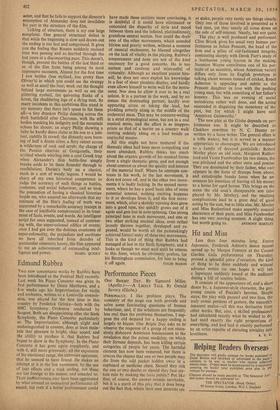Edmund Rubbra
Two new concertantc works by Rubbra have been introduced at the Festival Hall recently. Last week his Piano Concerto was given its first performance by Denis Matthews, and a few weeks ago his Improvisation for violin and orchestra, written to a Louisville commis- sion, was played for the first time in this country by Frederick Grinke—both with the BBC Symphony, Orchestra conducted by Sargent. Both are disappointing after the Sixth Symphony, the Piano Concerto particularly so. The Improvisation, although slight and undistinguished in content, does at least main tain that pleasure in bright, clear sound, and the ability to produce it, that Rubbra had begun to show in the Symphony. In the Piano Concerto it has gone again completely, and with it, still more grievously, all the expansion of his emotional range, the extrovert optimism, that he seemed to have found, He makes an attempt at it in the last movement, by the use of jazz effects and a trick ending, but these are too foreign to his nature, and sounded so. Their ineffectiveness may have been aggravated by what seemed an uninspired performance all round, but even, if a better performance could have made these sections more convincing, it is doubtful if it could have eliminated or
concealed the disparity of style and mood
between them and the inflated, platitudinously grandiose central section. Nor could the drab-
ness of the. other movements, which sounded
lifeless and poorly written, without a moment of musical excitement, be blamed altogether on the lack of vitality in the playing. Rubbra's temperament and taste arc not of the kind necessary for a good concerto. He is too
earnest and cautious and mistrustful of
virtuosity. Although an excellent pianist him- self, he does not once exploit his knowledge in a feat of sheer pianistic display, and hardly even allows himself to write well for the instru- ment. Nor does he allow it ever to be a real soloist. It is a partner in the work, and by no means the dominating partner, hardly ever appearing alone or taking the lead, but plodding soberly along in the middle of the orchestral mass. This may be concerto-writing in a strict etymological sense, but not in a real musical sense, and the effect is as inappro- priate as that of a terrier on a country walk trotting sedately along on a lead beside an unplayful master. All this might not have mattered if the thematic ideas had been more compelling and more abundant. Rubbra thinks too much about the organic growth of his musical forms from a single thematic germ, and not enough about contrast or about the quality and interest of the material itself. Where he attempts con- trasts in his work, in the last movement, it does not come off, and in the other two move- ments it is badly lacking. In the second move- ment, where he has a good basic idea of some potential interest, nothing exciting happens to it or develops from it, and the first move- ment, which, after a sketchy opening does grow into a good tune, too quickly grows out of it again and gets lost in note-spinning. One strong principal tune in each movement, and one or two other striking musical ideas, even rather loosely thrown together, developed and re- peated, would be worth all the painstakingly achieved formal unity of these two movements. This is the kind of thing that Rubbra had managed at last in the Sixth Symphony, and it looks as though we must wait until he returns to this form, which he obviously prefers, for his Birmingham commission, for him to bring


































 Previous page
Previous page